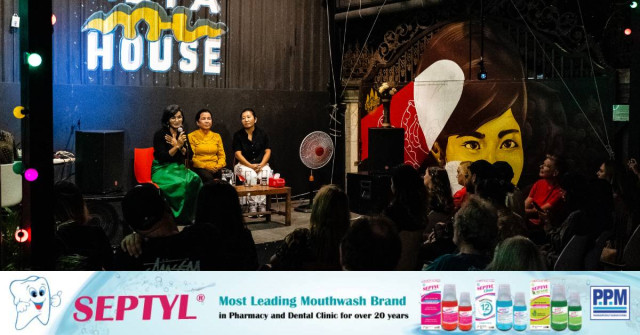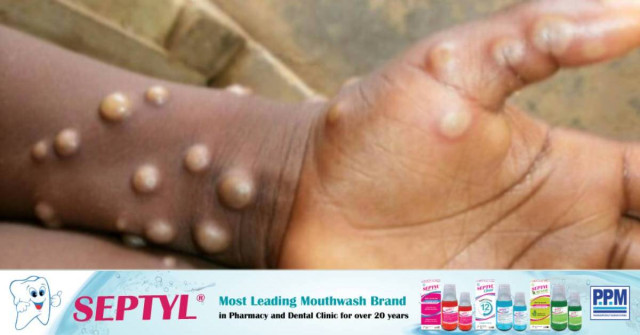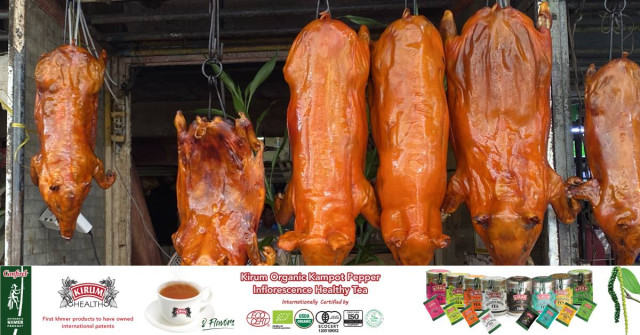Environmental-Friendly Water Treatment Systems Tackle Toxic Menace
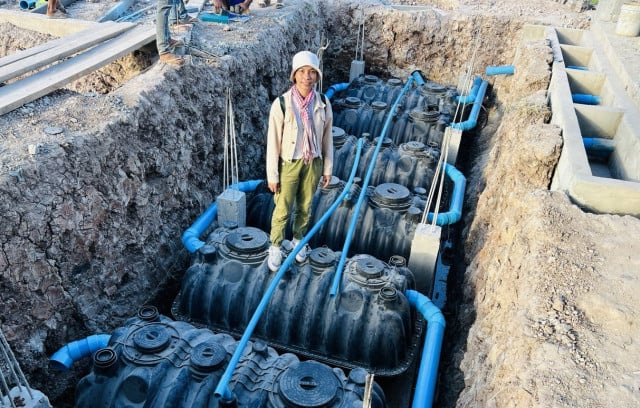
- By Phoung Vantha
- March 1, 2023 9:55 AM
PHNOM PENH – Offering affordable and small-scale wastewater treatment systems, using locally sourced and recycled materials: That is the ambitious goal a local social enterprise has set to meet the growing needs of Cambodian communities for clean water.
Vorn Thary, one of the co-founders and CEO of SUDrain, said wastewater management in Cambodia is increasingly challenging due to the surge of small and medium enterprises and construction companies that pour dirty and toxic waters into the country’s water sources.
“To mitigate the water crisis, we need to stop looking at wastewater as a waste but as a resource that we need to take care of,” said the entrepreneur.
To try to better manage wastewater in Cambodia, Thary decided to get to the root of the problem. She has invented a small-scale water treatment system that can be installed directly at the outlet of the pipes, to avoid discharging grey and dirty waters into nature.
The system, which has been designed to be implemented in small spaces, is both affordable and easy to maintain to ensure that its use spreads quickly in the country.
SUDrain’s filters use coconut fibers to remove most of the physical, biological, and chemical pollutants found in wastewater. The water goes through several plastic containers and tubes, where gravity attracts the pollutants at the bottom of the filters, before being released in the drainage system.
“The filters we use are all-natural materials and recycled products that can be found locally, without the need for modern equipment or large expensive machines that consume a lot of energy,” said Thary. After three to five years of use, the coconut filters can be replaced, while the old fibers can simply be composted, she added.
“Our business model aims to contribute to the completion of the 6th Sustainable Development Goal,” she added, referring to the United Nations’ 2030 agenda for sustainable development, where goal number 6 focuses on clean water and sanitation.
The company relies on three main activities: Consulting and designing the appropriate solution based on the client’s needs, building and installing the treatment system, and testing the water once the system is installed, to make sure the filter works adequately.
“These activities represent respectively 30, 60, and 10 percent of our revenue,” she said.
Products’ prices range from $2,500 for a capacity of 1-to-3 cubic meters a day–for a single household–to up to $8,000 for a daily wastewater treatment capacity of up to 6 cubic meters–which better suits resorts and communities.
Since its launch in 2019, the company has developed and implemented projects with business owners in Kampot, with the first system starting to operate in June 2022.
It has also installed wastewater treatment solutions for floating communities that have over 200 households, with the support of WaterAid, an organization focusing on better access to clean water, and the Provincial Departments of Rural Development.
“We really want sanitation and wastewater treatment to become a topic of discussion in Cambodia. But we also want to focus on innovative solutions and stop complaining that things go in the wrong direction,” said Thary.
Filtrating heavy metals and bacteria
The 31-year-old entrepreneur, who has a master’s degree in agro-industry and the environment, said she and her team chose this business because they want to help solve water pollution issues in Cambodia.
“If we do not solve it together, there will be serious problems in the future,” she said.
With its six employees, SUDrain is now seeking to scale up its production in Cambodia, where wastewater treatment is not yet well developed.
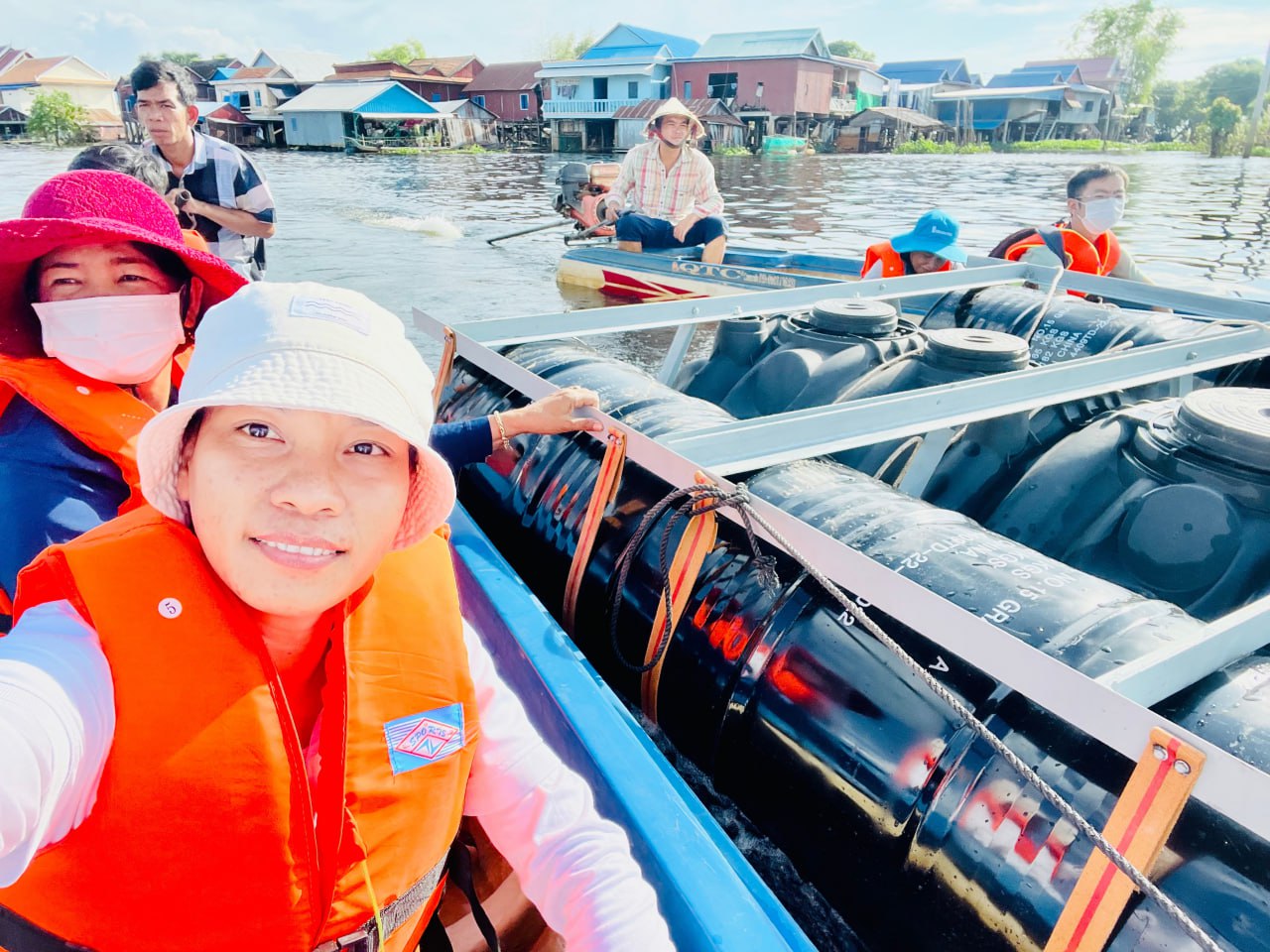
The system invented by SUDrain also suits the needs of floating villages. Vorn Thary installed one of the company's wastewater treatment plants in a floating village in Kandal province. Photo provided
“Currently, we are focusing on developing partnerships with international businesses and providing services to local business owners and development projects,” she said.
The filters are effective against physical pollutants, some heavy metals, and harmful bacteria such as E. coli.
“The wastewater treated from our system can be stored and used for gardening and plantations. Its quality meets the standard set by the Environment Ministry,” she said.
SUDrain says its customers include industrial companies, food processing firms, farms, real estate companies, schools, or hospitals. The same idea prevails for all types of potential clients: Cleaning wastewater on-site before releasing it into the environment.
As underlined by the European business chamber in Cambodia Eurocham in a briefing, wastewater treatment is not yet well developed in Cambodia and most of the discharged water is not properly treated before being released into the main water bodies.
As of 2020, there were four main wastewater treatment plants in the country with a total capacity of 37,850 cubic meters per day, according to the Ministry of Public Works and Transport. Six more national wastewater treatment plants are under design and construction, increasing capacity to 82,500 cubic meters per day.
Only a few cities have wastewater treatment facilities: Siem Reap, Sihanoukville, Battambang, and Phnom Penh. As a result, most of the wastewater is drained into natural lagoons, lakes, or rivers. Major cities like Phnom Penh or Sihanoukville often experience rainy-season flooding due to their fragile sewage and drainage system.
Several projects in the pipeline
The current situation is expected to change due to tourism development, the expansion of major cities, and the upcoming building of the country’s first large-scale wastewater treatment plants.
The Asia Development Bank (ADB) is financing several projects to implement a new wastewater treatment plant and new sewers in Battambang, a septage management system in Kampong Cham, the expansion of the wastewater treatment system in Sihanoukville as well as a new trunk sewer in Siem Reap. It granted Cambodia a $50 million loan in 2017.
In Phnom Penh, the Japanese International Cooperation Agency (JICA) is also financing a $25 million wastewater treatment with a capacity of 5,000 cubic meters per day. While such a treatment plant is highly necessary, it will nevertheless not be enough to absorb all of the city’s wastewater.
According to a 2019 briefing note from the Parliamentary Institute of Cambodia, wastewater released from Phnom Penh’s households contained 234 tons of feces, 2,335 cubic meters of urine, and 8,154 cubic meters of grey water every day. In addition to it, wastewater discharged from 3,000 small enterprises amounted to more than 1 million cubic meters daily.
“Only 9 percent of discharged water in Cambodia is properly treated before being released into the main water bodies, the second lowest capacity after Lao PDR in Southeast Asia,” noted the report.
Throughout Cambodia, there are also initiatives from the private sector to build wastewater treatment facilities as part of their corporate social responsibility strategy. While these facilities are small-scale, they encourage better practices at a reasonable cost.
To pursue its growth and quest for better-managed wastewater, SUDrain is now looking for investors and says that, as a start-up, financial and technical support are needed to grow.
“However, collaboration with WaterAid and the Provincial Departments of Rural Development has already helped a lot, allowing us to provide wastewater treatment systems for floating communities which have over 200 households,” Thary said.
“That amazing project allows us to put our dream to the test and help communities through social enterprise.”
Since May 2022, a draft law on wastewater and drainage is being discussed by the government to improve sewage management and wastewater treatment systems.
The upcoming projects will rely on the involvement of international donors, in particular the ADB and the World Bank, which will fund international tenders which can represent significant business opportunities.
In June 2020, the government received a $55 million loan from the World Bank to improve water supply and sanitation systems. Part of this loan was to be used in Siem Reap to build a drainage network connecting the sewage system to every household and business in the area.






